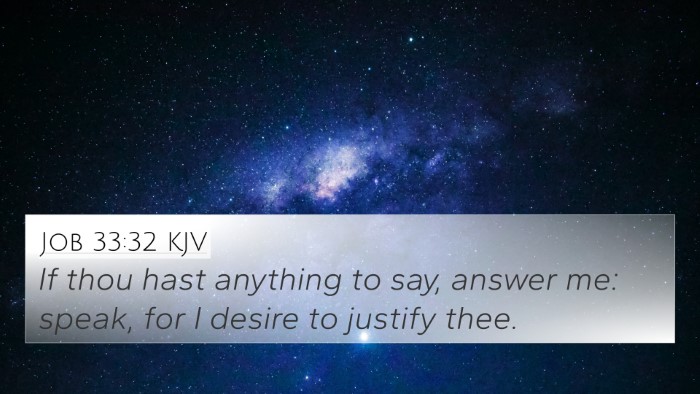Understanding Job 33:5
Job 33:5 states: "If you can answer me, set your objections in order before me; state your case." This verse comes from a dialogue between Job and Elihu, highlighting themes of communication, accountability, and the nature of God’s justice. The nuances packed within this single verse open avenues for deeper interpretation and cross-referencing with other scriptural texts.
Verse Context
In the context of the Book of Job, Elihu speaks after Job has expressed his grievances about divine justice and suffering. Elihu's voice introduces a younger perspective that aims to justify God’s actions and restore Job’s understanding of the divine.
Meaning and Interpretation
- Challenge to Job: Elihu calls Job to present his arguments, indicating that humans should be prepared to answer to God’s inquiries and reflect on their understanding of suffering and God’s justice.
- The Role of God: Elihu emphasizes that God is fair and just, indirectly stating that human beings, including Job, lack the fullness of understanding to question God's methods.
- Presence of Divine Wisdom: The verse underscores the importance of seeking wisdom from God, suggesting that even in times of distress, one should turn to God for understanding rather than questioning His character.
Commentary Insights
Matthew Henry
Matthew Henry explains that Elihu's challenge illustrates the importance of having a reasoned approach to faith. He underscores the misconception that Job has about God’s justice and how Elihu aims to realign Job’s thoughts with divine wisdom.
Albert Barnes
Albert Barnes focuses on the rhetorical nature of Elihu's challenge. He highlights that Elihu’s remarks to Job are framed to lead him towards accepting his situation and recognizing the omniscience of God.
Adam Clarke
Adam Clarke interprets this verse as a divine invitation to engage with God’s processes. Clarke notes that it is vital for believers to be open to dialogue and to express their thoughts candidly while acknowledging God’s ultimate authority.
Bible Verse Cross-References
Understanding Job 33:5 can be enhanced by considering related verses that share thematic links. Below are notable connections:
- Job 13:23 - "How many are my iniquities and sins? Make me know my transgression and my sin."
- Psalm 40:9-10 - "I have proclaimed glad tidings of righteousness in the great congregation; Behold, I will not restrain my lips, O LORD, You know."
- Proverbs 18:13 - "He who gives an answer before he hears, it is folly and shame to him."
- Isaiah 1:18 - "Come now, let us reason together," says the LORD. "Though your sins are like scarlet, they shall be as white as snow."
- Romans 12:1 - "I urge you therefore, brethren, by the mercies of God, to present your bodies a living and holy sacrifice, acceptable to God, which is your spiritual service of worship."
- James 1:5 - "But if any of you lacks wisdom, let him ask of God, who gives to all generously and without reproach, and it will be given to him."
- 1 Peter 3:15 - "But sanctify Christ as Lord in your hearts, always being ready to make a defense to everyone who asks you to give an account for the hope that is in you."
Thematic Bible Verse Connections
Job 33:5 raises several theological inquiries and opens discussions about suffering, divine justice, and human understanding. Key themes emerging from this verse can be interlinked through various scripture narratives:
- Suffering and Justice: The dialogue between suffering and God's fairness is prominent in the Psalms, especially in Psalm 73.
- Communication with God: Proverbs and Isaiah emphasize the importance of dialogue with God, presenting Him as willing to listen.
- Wisdom and Knowledge: The pursuit of wisdom is a continual theme in the Bible, especially highlighted in the books of Proverbs and Ecclesiastes.
Tools for Bible Cross-Referencing
To further explore the connections presented in Job 33:5 and other verses, consider utilizing the following tools:
- Bible Concordance
- Bible Cross-Reference Guide
- Cross-Reference Bible Study
- Bible Reference Resources
- Comprehensive Bible Cross-Reference Materials
Conclusion
Job 33:5 invites believers to engage thoughtfully with their doubts and questions while recognizing that comprehension of God’s plans may surpass human understanding. The rich cross-reference opportunities and thematic connections reinforce the truths echoed throughout Scripture regarding suffering, divine justice, and the pursuit of wisdom.










